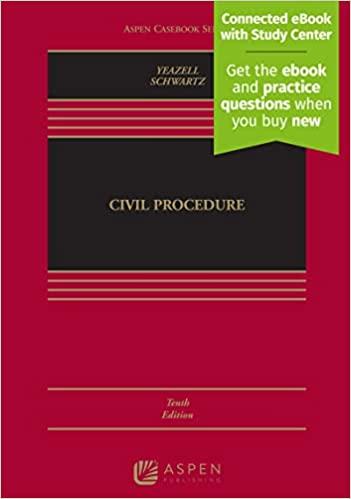Question
1. Why is it so important for the courts to be able to clearly distinguish between terms and mere representations, and how do the courts
1.
Why is it so important for the courts to be able to clearly distinguish between terms and mere representations, and how do the courts determine whether a statement is a term or a mere representation?
2.
I have seen some patients with chronic rheumatic heart disease with no
obvious evidence of rheumatic fever (i.e. they could not recall if there
was an episode of severe infection with subsequent fever and joint pain).
So, actually, how is chronic rheumatic heart disease diagnosed?
3
If a young patient presents with hemiparesis and rheumatic atrial
fibrillation and is already on oral anticoagulant, with an international
normalized ratio (INR) 3 and a normal computed tomography (CT)
scan done 2 hours after onset, should he receive heparin for prophylaxis
against further embolism? Should aspirin be combined with oral
anticoagulant later, or should target INR be increased?
4
When treating mitral stenosis using a balloon valvotomy, how come no
thrombus develops at the site of the atrial septum or at the separated
commissure of the valve leaflets?
5
Why does a mitral stenosis produce a loud
6
Why is the mitral valve more affected than any other valve in the heart in
most valvular diseases?
7
What is William's syndrome (supravalvular obstruction)? Why does
hypercalcaemia occur with this syndrome?
8
Kindly tell me all the causes postulated for the collapsing pulse seen in
aortic regurgitation.
9
Does pulmonary stenosis cause pulmonary hypertension?
10
Under what conditions would a pulsatile liver be found and what is its
clinical significance?
11
Can we use warfarin during pregnancy or during menstruation in
a patient with a prosthetic valve? Is anticoagulation necessary in a
patient with a corrected ventricular septal defect (VSD) or corrected
coarctation of aorta?
12
I want to ask about Duke criteria in diagnosing infective endocarditis.
13
Is Staphylococcus aureus the most frequent causative agent of acute
bacterial endocarditis? And is this typical of acute bacterial endocarditis?
14
Please explain the mechanism of the mycotic aneurysm in infective
endocarditis.
15
Why are the right valves more commonly affected in infective
endocarditis when the microbes enter through the IV route, for example
- with IV drug users?
Step by Step Solution
There are 3 Steps involved in it
Step: 1

Get Instant Access to Expert-Tailored Solutions
See step-by-step solutions with expert insights and AI powered tools for academic success
Step: 2

Step: 3

Ace Your Homework with AI
Get the answers you need in no time with our AI-driven, step-by-step assistance
Get Started


